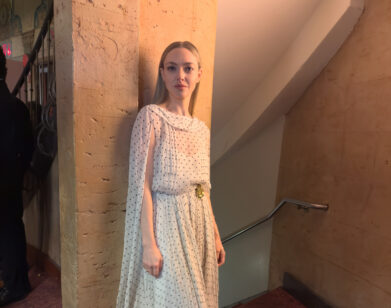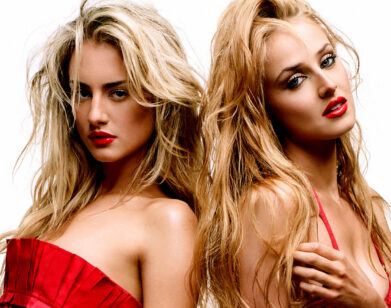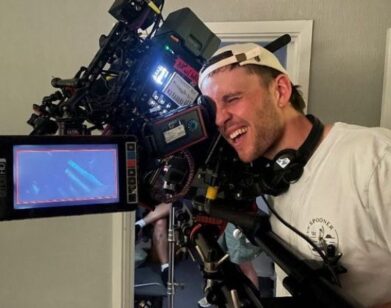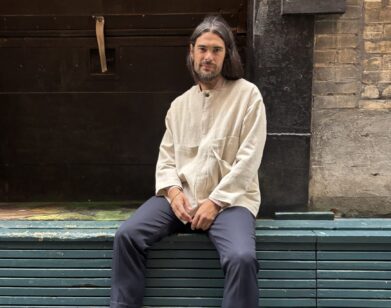The Truth About Aneurin Barnard
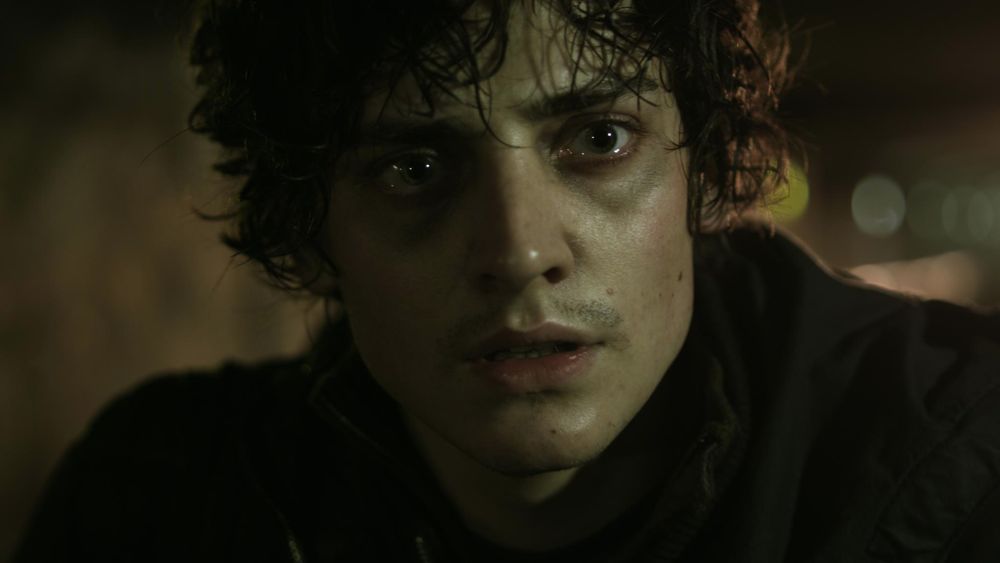
ABOVE: ANEURIN BARNARD IN CITADEL.
In talking to Welsh-born actor Aneurin Barnard, it becomes quite clear that at 25, his eagerness to take on the identity-bending world of acting, and his love of the craft, is unparalleled. Barnard, who studied at the Royal Welsh College of Music & Drama, won a Laurence Olivier Award for his role as Melchior in the London premiere of the Tony-lavished musical Spring Awakening. He has continued to immerse himself in experience, picking up roles in film and television that span the historical (Swinging ’60s photographer David Bailey in We’ll Take Manhattan; ’70s teen Davey in Hunky Dory) and the fantastical (a young agoraphobic father in horror darling Citadel; a sci-fi turn in The Facility).
He names fellow Welshman Richard Burton as his acting paragon, and while both Burton and Barnard hail from rural coal-mining country, the similarities don’t end there—Barnard is well on his way to having the career Burton did, concentrating on craft and mastering genre, stage, and screen.
2013 will certainly be a significant year for Barnard as he releases four films—the stirring Trap for Cinderella, Victorian fantasy Mariah Mundi and the Midas Box, Thomas Imbach’s Mary, Queen of Scots. His first American film, the thriller Emanuel and the Truth About Fishes, with Kaya Scodelario and Alfred Molina, will be competing at Sundance later this month.
We spoke with Barnard in December. The actor took a breather from filming battle scenes in Belgium for the BBC’s War of the Roses series, The White Queen, in which he plays Richard, Duke of Gloucester, and shared his influences and aspirations with us. Topics of conversation included method, music, and the granddaddy of all Brit acting roles—James Bond.
COLLEEN KELSEY: You’ve done quite a few period pieces. You must be accustomed to wearing armor by now.
ANEURIN BARNARD: [chuckles] Yeah, there’s a lot of armor in this, and period costume. It’s great. It’s nice to be able to go back and do it the way it used to be done.
KELSEY: Can you remember when you first decided you wanted to be an actor?
BARNARD: For me, it started off very early on in my life. I came from a very, very small valley in the middle of South Wales. I grew up there with my father, who’s a coal miner, and my mother worked in a normal factory. I used to just daydream all the time about being in movies, from the age of like, four onwards. I would sit down and watch movies with my father and my grandfather, and always pretended that I was in the stories. So I would spend my time reenacting them around the house, while annoying my sister and my mother and father with me pretending to be a cowboy or pretending to be James Bond. For me, it was really difficult because I didn’t know how I could fall into that world, and, of course, no one in my family had connections in the industry. A friend of mine once, when I was 11 years old, mentioned that there was a youth theater, a local amateur youth theater nearby where young people could go every Sunday. And that’s where it began, really.
KELSEY: And you went on to train seriously.
BARNARD: I was in school at the time. I was really bored in school because I couldn’t do what I wanted to do, which was act. And then when I was 14, a local TV company came to the youth theater and they were auditioning kids to be in this new TV series. That was my first job when I was 14, and I went out of school for about three or four months to film this TV shoot, and I decided that it was definitely what I wanted to do. I realized that the actors that I liked and admired all went to drama school and got an agent that way. So I started when I was about 16 in drama school, and then I knew I had to wait until I was 18 so I could go on auditions, and I tried to get into one of the ones that I liked and then go from there. Lucky enough, after three years of training, I got approached by a lot of agents, and I was in a great position where I could pick who I wanted to go with, and ever since I left drama school, I’ve been working ever since.
KELSEY: Have there been any actors that have influenced you, or you look up to, in terms of their careers?
BARNARD: A few, for different reasons, but my biggest icon is Richard Burton, a fellow Welshman. I love his presence as an actor and I love how he commands his roles. That was always a very big influence, and I think it’s also to do with that he came from a similar background to my own, in many ways, in locations and people, and that’s an inspiration constantly. Like, present generation, I suppose, Johnny Depp is a really big influence. I love his work, and I love his career, his choices. There’s always, for me, Marlon Brando. I remember watching A Streetcar Named Desire when I was quite young, I was about 12, or 13, and I watched it, thinking, “Wow. That is pretty cool. I’d like to do something like that.”
KELSEY: You’ve done quite a lot of theater work. How is it to have your roots on the stage and then transition to TV and film? Do you feel more comfortable with one? Do you get something out of one that you don’t with the other?
BARNARD: They do work in different ways. Of course, when you’re doing a play, you’re onstage, and there’s no stopping or starting and there’s no stopping to reposition for the camera or have a check done. You’re on the stage and you’re there ‘till the end of the show. What that gives you is a great gift, which is to command the audience, and you get to play with your script and your fellow actors. Every night, it’s different. Hopefully it goes well and you get a great response. But the technique that you have to have on film or television is so delicate. It’s fine-tuning. That is very different from being onstage, but they both have important skill sets. They’re very similar in many ways, but also they’re very different. I love being able to just transform into someone through different media. I really enjoy that, so both are equally important to me. I have a lot of fun in both of them.
KELSEY: You’ve had experience with musicals as well, and singing. Do you have any ambitions to get more into music or record an album?
BARNARD: It’s funny, because I started off singing quite young as well and was approached by this record label when I was a teenager, and I kind of walked away from it because I knew how important the acting was and how much I didn’t want to be a singer who became an actor, I wanted to become an actor who could sing. I believe that the greatest music is storytelling anyway, in a heightened medium. So I write a lot of music, and I play a lot with my guitar, I still sing a lot, but now I’m more personal about it than public, in a way. I think there will be a time where I’d like to bring the singing back into some of my performances. It all depends if the material’s right, if the story’s right, if it’s my kind of taste in music, as well. It means so much to me. We all know how affective music can be, I just want to make sure when I do it, I’m doing it because I actually feel it and I care about it.
KELSEY: You’ve been really busy in terms of making work; you’ve had quite a few movies come out this year and have a bunch coming out in 2013, and I think what’s really interesting about all of them is they’re all from different genres, whether it’s the period pieces like Mary, Queen of Scots, or a horror film like Citadel, or Mariah Mundi, which is really fantastical… how do you approach them? What makes a movie attractive to you?
BARNARD: The biggest thing about me, as an actor, is I’m never a finished product, you know? I always want to try something or be in a new genre because, one, it’s much more fun to do that because you’re not doing the same thing over and over. One of the greatest reasons is that it keeps stretching you as an actor. So, hopefully, my method is that it makes me a better actor, and a more believable actor, so then, the more experience I have in any way possible, in a drama or a musical genre, different formats of working, the better I can be on all different platforms.
KELSEY: And last week it was announced that Emanuel and the Truth About Fishes has been selected for Sundance. Are you planning on going to the festival?
BARNARD: Yeah! I’m really, really hoping to go. It’s great news. Being involved in that movie, there were a few things that were fighting against us on that film, and everyone stuck through it, to make sure that it got made, through the thick and thin. Now it’s in the main competition at Sundance. It’s a fantastic thing to be involved in. I’ve never been to Sundance before. Also, this was my first American movie as well, so the fact that this is the first American movie I’ve done and it’s going straight to Sundance is a big thing for me, and I’m so proud that the film is going there. Of course, I’m going to try my best to get out there, but as you know, I’m stuck with a very busy schedule. It’s just getting busier and busier at the moment with The White Queen. But hopefully, they’ll give me a few days to get to Sundance and enjoy the moment of it being there.
KELSEY: You continue to work with quite diverse roles, but if you could work with any director on any project in the future, what would it be?
BARNARD: I’m not sure if there’s a dream role, but there’s people—for instance, I’d love to work with, say, Christopher Nolan or Anthony Hopkins. But there are so many more that I’d love to work with, of course. Role-wise, anything that I’ve never played before, that’s what it is. I have, like, one secret dream role, which is James Bond. Now, I’m not saying that I’ll ever be James Bond or be considered, but it’s the one role that I grew up watching, all the James Bond movies, with my two grandfathers and my father, and it’s like our secret little film that we love to watch together. In a way, it would be my love letter and saying thank you to my two grandfathers and my father, if I could play that role one day. Or even be in one. To say, “We used to sit down and watch this on a Sunday afternoon, and now, I’m in one.” That would be one of the sweetest moments I could ever share in a career.
EMANUEL AND THE TRUTH ABOUT FISHES PREMIERES JANUARY 19TH AT THE SUNDANCE FILM FESTIVAL.

